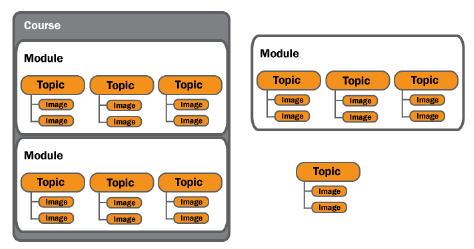A Learning Object Repository (LOR) is an online library for storing, managing, and sharing your learning resources (learning objects). A learning object can be a quiz, a presentation, an image, a video, or any other kind of document or file you use to create course content and learning materials for online learning.
When you publish your learning objects to Learning Repository, you tag those objects with metadata to classify and organize your learning objects and make them easily searchable for others. You can classify learning objects according to defined learning standards or goals. You can also review, rate, and provide feedback on learning objects to ensure high quality online resources.
A learning object repository (LOR) is a general term for an online collection of learning objects. A learning object is an object or collection of objects that assists in the learning process (e.g., a topic, a module, a course, a quiz etc).
A course is a collection of modules, and a module is a collection of modules and topics. Topics have no children and cannot be descendants of a course. Topics are simple file associations (e.g., a PowerPoint file, an HTML file, a multimedia file, a URL, etc).

Examples of Learning Objects
You can also store individual files with no associations in an LOR. An individual file is not considered a learning object, but must be handled by the LOR (e.g., a GIF file included in an HTML topic). Within the LOR a topic can contain a file, but modules and courses cannot.

Examples of individual files
Click ![]() LOR on the navbar, or click the Learning Repository (LOR) widget on My Home or Course Home if it is available.
LOR on the navbar, or click the Learning Repository (LOR) widget on My Home or Course Home if it is available.
Learning Repository connects to Learning Environment through the following:
Complex Learning Object A learning object that can have sub-objects (i.e., a module, or a course).
Course A collection of modules.
Federated Repository Repositories hosted by other institutions which you can access remotely (e.g. MERLOT, or those using the SRU (Search and Retrieve by URL) protocol).
Federated Search Search of federated repositories (hosted by other institutions which you can access remotely).
Harvesting Metadata Retrieving metadata from learning objects in another repository.
Learning Object Repository (LOR) A library of stand-alone learning objects (LOs) from which users access LOs (i.e. modules, topics, or courses).
Learning Object (LO) A resource or collection of objects that assists in the learning process (e.g. a file, a topic, a course, etc.).
Metadata A definition or description of data, or “data about data.” Learning Repository only accepts metadata tags created using the IEEE LOM MAP (Metadata Application Profile). All searches use the IEEE LOM metadata fields.
Module A collection of topics and/or other modules.
OAI-PMH (Open Access Initiative Protocol for Metadata Harvesting) This is an industry standard protocol to implement a harvesting solution.
OER (Open Educational Resources) Digital teaching and learning materials that are available for free online through open licenses.
Org unit A department, semester, course offering, or other item within Learning Environment’s organizational structure.
Permissions Settings that control the functionality users can access in Learning Repository, as assigned in Roles and Permissions. Not the same as trust permissions (described below).
QTI Package (Question and Test Interoperability specification) a standard specification format used for assessment materials. The specification packages such items as questions, assessments and results, enabling this content to be authored and used across multiple systems.
Roles An assigned role as defined by a user’s enrollments. A user’s role defines their permissions.
SRU (Search and Retrieve by URL) a standard protocol for internet search queries.
Taxon An individual element in a taxon path.
Taxon Path A hierarchical classification scheme, where each succeeding level refines the definition of the higher level.
Topics Simple file associations (e.g. a PowerPoint file, a HTML file, a multimedia file, a URL, etc.). Topics have no children of their own and cannot be children of a course. Topics can contain files, but modules or courses cannot.
Trust The relationship between an LOR and an org unit. A trust contains three elements: an LOR, an org unit, and the trust permissions.
Trust permissions The roles and permissions assigned to each LOR trust.